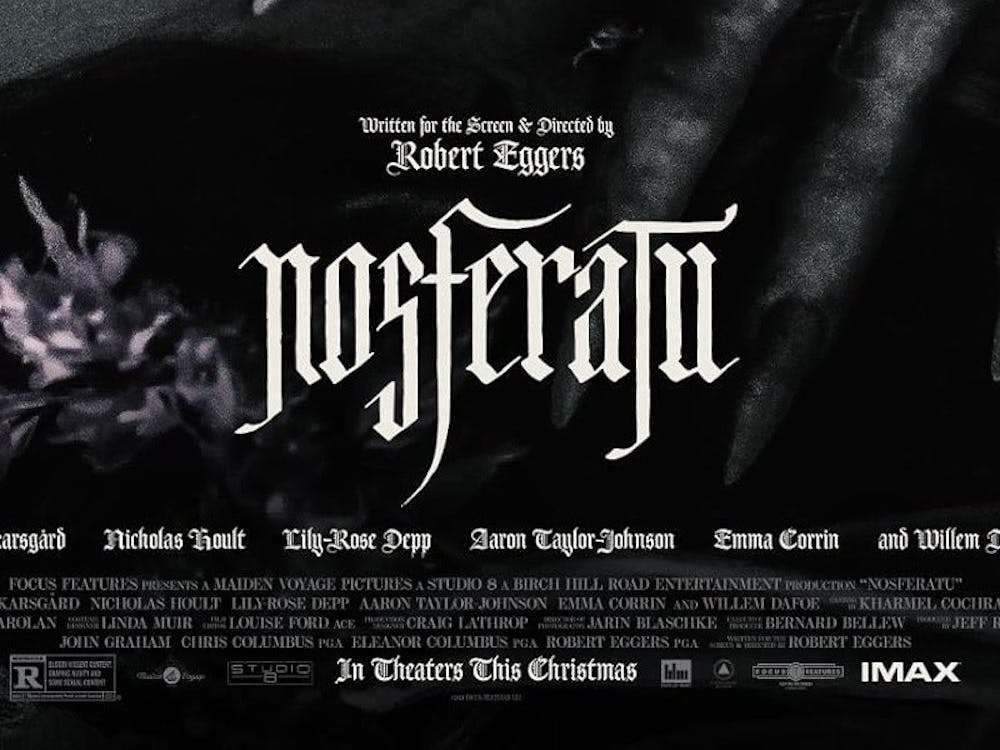Robert Eggers has developed a reputation as a director of high-quality, horror-centric period pieces. His most recent film “Nosferatu” (2024) — a remake of the 1922 silent German film of the same name — continues the trend while putting an emphasis on mood and themes.
“Nosferatu,” on the surface, tells the story of Thomas Hutter (Nicholas Hoult) and his wife Ellen Hutter (Lily Rose Depp), residents of Wisborg, Germany. Like the original film, this one borrows heavily from “Dracula.” Thomas journeys to Transylvania, a province nestled in the Carpathian Mountains, to complete the sale of a small estate in Wisborg to the mysterious Count Orlok (Bill Skarsgard). If successful in completing the deal, he stands to secure his and his wife’s financial future. But he soon realizes that Count Orlok is neither human nor benevolent. Instead, he is the malicious vampire Nosferatu and he has his eyes on Ellen, whom he is determined to make his bride.
The remainder of the movie portrays Orlok’s journey to Wisburg, Ellen’s mysterious ailment, and the struggles of numerous characters — with scientist and occultist Albin Eberhart Von Franz (Willem Dafoe) chief among them — to defeat Orlok. The film is gothic horror to its core; while characters contribute to the film, the sense of dread and despair matter most.
Such vibes are perfectly cultivated by the movie, which expertly mixes performance, lighting, filmography and setting to pay homage to the original “Nosferatu” while establishing the modern version as a distinct film. Hoult and Depp deliver powerful and emotional performances that anchor the film, while Skarsgard and regular Eggers-collaborator Dafoe deliver strong character performances that make the film come alive.
The film takes place almost entirely during pouring rain, dark nights and overcast days. This gloomy setting — coupled with overwhelmingly sparse lighting — makes the film feel oppressively desolate and hopeless. Eggers heightens this with exceptional directing, emphasizing grim visual, such as horrifying plagues sweeping through towns, violent deaths and bloody ends.
Eggers also makes heavy use of shadow in a way that pays homage to the original film. Orlok’s movements are portrayed as shadows in the night, highlighting his subterfuge and backhanded schemes. Though different from the original 1922 film’s haunting and powerful score, the score used is quite strong, using pianos and other string instruments — and occasional percussive beats — to complement the gloomy mood and accentuate moments of action.
Interestingly, the movie focuses on the limitations of science, a theme developed through conversations between different characters about their efforts to cure Ellen and defeat Nosferatu. At one point, Von Franz makes a remark that feels reminiscent of Nietzche’s critique that science — while helpful in many places — has eroded key institutions. At other times, the discussion suggests science is outright harmful as the main characters’ unwillingness to abandon science keeps them from properly combating Nosferatu. This reference parallels Rousseau's famous attack on science in “Discourse on the Arts and Sciences.” The characters only are able to make progress when they adopt a Popperian conception of science that sees science as a set of falsifiable beliefs and ideas. Nosferatu’s mere existence falsifies their belief that vampires do not exist, and only by accepting that vampires exist and must be fought through supernatural means are they able to move forward. In making this film, Eggers transforms a seeming critique of science into an argument against dogma of all types.
Within Eggers’ small but growing filmography, “Nosferatu” (2024) feels more akin to “The Witch” (2015) and “The Lighthouse” (2019) than “The Northman” (2022). Yet the film feels more refined, likely a reflection on Eggers’ growing experience and a much larger budget than his earlier films.
Overall, “Nosferatu” is another great Eggers flick and one of the best Gothic horror pieces of recent memory. More than being a great genre piece, this film projects powerful thematic messages.
Get The Chronicle straight to your inbox
Sign up for our weekly newsletter. Cancel at any time.
Zev van Zanten is a Trinity junior and recess editor of The Chronicle's 120th volume.

